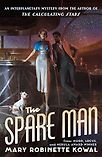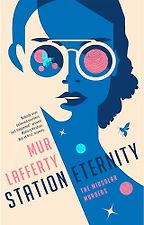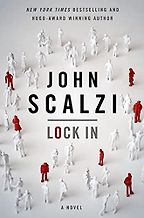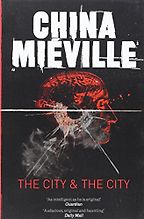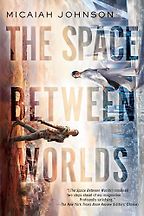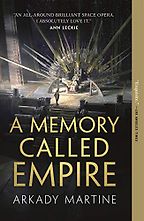There are of course many types of mystery story and many types of sci-fi story, which can be recombined for a whole range of effects. What is the general appeal of this mystery-plus-sci-fi approach?
I tend to break genres into two overarching categories. There are structure-driven genres like mystery, heist, thriller, or romance. And then there are aesthetic-driven genres like science fiction, fantasy, and historical fiction. Those don’t have any inherent structure on their own, but what they’re really good at is creating an atmospheric sense of wonder. So when you take a mystery, which can be sometimes predictable, and you layer science fiction on top of it, it gives a structure to a genre that doesn’t otherwise have one. And you have this whole new range of tools that you can play with, that can cause the mystery to go in different directions.
Could you introduce us to your first sci-fi mystery recommendation, Station Eternity by Mur Lafferty?
First of all, I love Mur’s writing. And the thing that I particularly love about this book is that it explores one of the conceits of a standard cosy mystery… No one would ever go anywhere with Murder She Wrote’s Jessica Fletcher, because there are dead bodies everywhere she goes. So Mur’s main character Mallory has this syndrome: everywhere she goes, someone gets killed. To deal with that, she takes refuge on a space station where there are no humans, to avoid getting anyone killed. And then, of course, someone comes to the station – and murder happens.
So we have this great whodunnit. It’s a delightful romp. It has the witty banter that you want from this kind of thing. And then also, there’s her dealing with all of the baggage of having seen and witnessed so many deaths.
I just thought it was a hoot, and had all the twists and turns that I wanted from a murder mystery.
Can the answers be deduced?
Definitely! I think that she plays fair – even with the science fiction that she has created, she presents it so you always have the knowledge you need before you get to doing the thing. I think all of the books that I’ve picked play fair.
Some mysteries feel more like thrillers, like they aren’t meant to be solved…
Yes. Dashiell Hammett talks about this – that there’s a difference between what he does, and what Agatha Christie was doing. With an Agatha Christie, the reader was meant to be able to figure it out. With a hard-boiled detective novel, it’s more about the mood and the tone – everything is supposed to be confusing and moving at a really rapid pace. So it’s starting to pick up some of that thriller vibe; you’re not supposed to be able to figure it out.
In fact, when they were filming The Big Sleep, they got Chandler on the phone. They said, “We figured out who kills everybody else. But there’s this sixth death – who did that?” And he’s like, “I don’t know, doesn’t matter. It’s just there for the tone.” I watched the film, and I said, “So which was the murder that they didn’t know?” And my husband told me, and I realised – oh, yeah, that isn’t resolved at any point, is it? That doesn’t make any sense. But you just don’t care.
Is there ultimately an explanation for Mallory’s syndrome? It seems that often in sci-fi mysteries, alongside the whodunnit, there’s a mysterious phenomenon to be solved as well…
There are! There’s more than one mystery happening in this, which is one of the things that I think I enjoy about it, and some of the additional mysteries are specifically science fiction based. Not just the whodunnit, but howdunnit and whydunnit.
There’s a mysterious phenomenon front and centre in your next sci-fi mystery choice: Lock In by John Scalzi.
So Lock In takes the idea of locked-in syndrome, which is a thing that actually happens to people; but he’s imagining that there’s a highly contagious virus called Haden’s syndrome. There’s been a global pandemic that caused people to get locked in. So instead of having a small handful of society who’ve been locked in by something like Lou Gehrig’s disease, this is a huge, huge amount of the population. People are still completely awake and alert.
They come up with these C-3POs, they call them ‘threeps,’ which are basically robots that people can put their brains in. Their body still exists, but they can wirelessly connect and move the body around so that they can interact and move through the world. There’s also a kind of virtual space that people can be in. Finally, there are integrators: an integrator can let someone with Haden’s syndrome borrow their body. So instead of just having a robot body, you have a flesh and blood body. You get to have different sets of feelings.
Chris Shane, a rookie FBI agent, gets assigned to this murder. It’s committed by an integrator – so, the integrator had a client. You have to figure out who the suspect is: is it the integrator? Is it the client, and then which client is it?
It gets so much more complicated as it goes on. There’s a bigger problem. Every answer that Chris finds unlocks a different question. It’s sitting somewhere in the police procedural, hardboiled detective area. He plays fair in that, if you read it a second time, all of the things are there; but often you are in a this-is-very-confusing state, which he borrows from the hardboiled detective novel.
Messing around with personal identity feels like such an appealing reason to mix sci-fi and mystery – it’s such a classic sci-fi trope.
Yeah! Speaking of identity, one of the things that I particularly enjoy and admire in these books is that Scalzi has chosen a deliberately androgynous name, Chris, and he never genders the character. You do not know at any point where Chris lands on the gender spectrum. When they did the audiobook, they had two different versions, one with a male narrator and one with a female narrator. And different readers will make different assumptions.
Your own mystery, The Spare Man, also uses technologies to confuse your reader around identity. And also treats gender a little differently…
Yes, so there’s a couple of things. One is the technology that my main character Tesla uses. She was in a horrific accident in her backstory, so she has what’s called a deep brain pain suppressor. It’s based on a device that my mother had in her head, which was a deep brain stimulator for Parkinson’s. When Mom activated it for the first time, I said, “Oh, this is a miracle.” Because she had been tremoring; she had needed to use a walker to go in into the building; her voice, her speech was slushy… and they activated it, and her symptoms just stopped. The tremor just cut off. Her speech was back to the way it was before the disease. So I thought, “What happens if we could manage pain that way?” It’s one of those technologies that is around the corner. And at some point, this book will not be science fiction anymore – at least that part of it won’t be.
I wanted to give her that, but I also wanted to honour the choices that you still have to make – any medication, any device, any sort of adaptation always has a side effect. With Tesla, her side effect is she feels pain-less, but she also feels sensitive touch-less. So she has to make a decision: back doesn’t hurt, or can feel my husband touched me. So that was fun to play with. In the ways that novelists like to torture characters.
For gender – the book is set, in my brain, in about 2074. I wanted to be far enough in the future that I could imagine things having changed, but also choose a time when people who are alive today would still be alive, so that you have more than one generation of experience. I’ve been struck by the way, at science fiction conventions and over Zoom, we do pronouns – when you do a panel, you say, “My name is Mary Robinette Kowal, she/her.” It’s listed on my Zoom account. So I thought, maybe that just becomes part of natural speech – you just do that when you introduce yourself to someone.
The way we’re headed with AI, one of the things that I would love is something that would immediately tell me someone’s name, because I’m terrible with them. And they would also just tell me the gender so that there’s no guessing. Someone who had grown up in that would then grow up with the default that you don’t make any assumptions until the person tells you. So I wanted to play with that.
I had to hire a sensitivity reader to work with me on that, because I’m also a 54-year-old woman who grew up in the binary and still have things that I default to, completely unconsciously. So I wanted to get someone in there to help me not do that. For instance, a small thing, but my main character’s husband did not do needlepoint in the original. In my first draft, Tesla did that. My reader, Christine Sandquist – who is available for hire, and very, very good – she said, “You know that this is gendered? Everybody who’s doing crafts in this book is female presenting.” And I had not noticed that! So I just shifted which spouse was doing it – and then it gave me opportunities later.
There were so many different small speculative elements, social and technological, that all bled into the mystery in different ways – as opposed to one central concept, like in Lock In. I was really struck by the fact that space travel and the spaceship don’t matter at all – they just made it a locked room mystery, right?
Yeah. So it is a locked room murder mystery, technically, but also this spaceship has around 3000 people on it that I just ignore. Part of it is that my characters are in the very fancy suite section, which does limit it to eight cabins of passengers that could have been at the scene of the crime. But otherwise, I just ignore exactly how many people are on that ship.
Your next choice takes us more broadly into speculative fiction. Could you tell us about The City and The City by China Miéville?
Yeah, I wavered on whether The City and The City was science fiction or fantasy or… it’s one of those books where you just don’t even know what genre it is. This book messed with my brain so much.
There’s a murder investigation and there are two cities that exist side by side, overlapping each other. Their relationship is unclear right at the beginning: they occupy the same geographical space, theoretically in Eastern Europe, but they are two different cities by custom and law. If something comes from one city into the other, it’s called breaching. And breaching is considered a crime worse than murder.
There’s a moment we arrive at the scene of the initial crime, where the detective looks up, and sees through into the other city. Then he has to unsee the person that was there. It’s so unsettling. The nature of the crime is such that we have to involve detectives from both cities, so they are working in parallel, and having to make decisions about which city they’re in at any given moment. It’s so twisty on so many different levels.
It’s stuck with me so much because it is so familiar – it is how we inhabit cities, certainly British cities. There are parts of the city we just don’t see.
I remember that there was language for it. The Twin Cities are composed of ‘crosshatched,’ ‘alter,’ and ‘total’ areas. Total areas are just one city. Alter areas are totally in the other city. And then, in between those areas, are cross hatches, which would have different names depending on which city you lived in.
In your next choice we go from small city politics out into the multiverse… Could you introduce The Space Between Worlds by Micaiah Johnson?
Micaiah Johnson has imagined a world in which the multiverse exists, and you can hop from one universe to another, but you can only do that if you don’t have a counterpart there. So if you have died or were just never born, you can go there. If you attempt to go there, and you exist, you suffer a horrible death. This means that people who are very likely to have died young, basically from being a marginalised member of society, then become extremely highly valued – they can go to a lot more universes than someone who had all of the privilege of a safe upbringing.
Our protagonist Cara can go to 372 worlds, and there are only eight that she can’t go to. Then one of her eight remaining doppelgangers dies under mysterious circumstances, in ways that make her think that this person was murdered, and probably murdered by someone that she herself had a past with. But maybe not – because every doppelganger is a little bit different. So trying to figure out who did the murdering and how, and what the circumstances are around it, is really interesting.
There’s more than one murder, and each question unlocks a different question. It’s dealing with class and race and corporate greed. I think it’s wonderful.
To put it in the terminology of your podcast, Writing Excuses, this sounds like a thriller as much as a mystery…
Yes! There are parts of it that are definitely a thriller, which give it that clipping-along momentum… But a lot of it is character portrait. In one of the worlds, she has the opportunity to see family members who had died in her own world. She has an extremely complicated reaction – they are expecting her to be someone else, and she has to be that someone else; and she’s seeing these people who are almost the people that she loves, but not quite. There are parts of it that are really, really moving, exploring all the emotional and social implications of the initial science fiction setup.
And messing around with personal identity again…
Yeah, I do tend to lean towards that apparently!
We’ve come to your last sci-fi mystery book: A Memory Called Empire by Arkady Martine. It previously appeared on Five Books when it was shortlisted for the Arthur C. Clarke Award in 2020. Could you re-introduce us?
This is a pretty straight-up murder mystery, but the world-building in it is so compelling. Mahit Dzmare is an ambassador from Lsel station, which is a 30,000-person space station, and it’s independent. There’s a massive, massive Empire, the Teixcalaanli Empire. Lsel is constantly having defend itself – not with weapons, but with diplomacy – to try not to be annexed. So Mahit has been sent to be the ambassador at the Empire’s city-state planet, the seat of the Empire. Her predecessor has been killed.
On of the technologies that Lsel station has is something called an imago, which is basically a recording of a person. Let’s say that you’re a pilot, and you have very specialised skill; your successor gets given your memories. They pick people who have close personalities, and they go through this year-long integration process, so that the memories don’t override the person whose body it is. The idea is that it’s like having a mentor who can go along with you, and has all of the ingrained, internalised knowledge that takes years or decades to acquire. You have someone that you can ask questions; you remain yourself, but with a partner, or this other aspect of self.
Mahit doesn’t get to do that. She has three months to integrate. And she’s working within an imago that’s 15 years out of date – the person who was murdered has not been back to Lsel for 15 years – so she’s dealing with out-of-date information. When she arrives, she’s immediately confronted with this corpse, and it’s clear that he didn’t die of natural causes, no matter what people are saying. He was murdered. And she has to figure out who did it. While also being the ambassador.
The Empire’s word for people who are not from there is ‘barbarian.’ So she’s this barbarian, to them. But she’s also spent her entire life studying Teixcalaanli literature and society, and she speaks the language fluently. Sometimes she has to pretend to be a full-on barbarian, because that gives her a tool that she can use to get the information that she wants. Other times she has to dial it all the way up, and be as sophisticated and polished as she can be.
She’s attempting to defend her home from this empire using diplomacy, and she loves her home. But also, the reason she’s a good fit to go to the Empire is that she loves Teixcalaanli culture. How those two things pull on her as she’s investigating this mystery is really delicious. The world-building is also just lovely. It’s interesting, because it gives the sense of being this really big, sprawling empire – but really you’ve got a pretty small cast, and only a few locations that you actually go to. The culture is so rich that you can feel the rest of the galaxy.
It must be a hard balance writing this kind of novel – you’re already asking your readers to do so much detective work just to understand a sci-fi world, but that’s got to feel effortless, so that they’re happy to do the additional work of following you on the mystery.
She does it very cleverly. Just as an example, when Mahit first arrives and she has the imago with her, her predecessor says that he had the same feelings that she did when he arrived – being overwhelmed by the grandeur, and how beautiful it was – and then she finally gets up off her ship into the spaceport, and what Arkady describes is basically every airport lounge ever. It’s just high-tread carpets and glass and steel. So she grounds you with things that are really familiar to anyone who’s travelled. There’s another point right before she gets off the ship where, even though she speaks the language fluently, she is rehearsing what she’s supposed to say. And if you speak another language, and you travel to another country, this is a thing that you do! You sit there and think: ok – I want to buy a stamp. Stamp, stamp, I want to buy a stamp. You just keep saying it over and over in your head, until you can go up there and say: “I want to buy a stamp.”
We’ve covered a whole range of different flavours of sci-fi, and a few different flavours of mystery. There are no real cosy mysteries here, where the detectives are in no danger and it’s all just a puzzle. Is that out of fashion in general? Or is it just not really touching sci-fi?
I think it’s definitely still in fashion in straight-up mystery. I think that in science fiction and fantasy, we have such an assumption that there must be an evil overlord that we tend to go straight into conspiracy theory. So there’s always some larger thing that’s going wrong. I think some of that is because we have inherited a lot of our science fiction from Cold War stuff or from Westerns: there’s the bad guy, then there’s the big bad guy, and there’s got to be a shootout at some point. So I think some of that is in the DNA of how we unconsciously tend to write with science fiction: there has to be something bigger and badder going wrong. The other factor is that doing that gives you more room to explore the world, because it pushes the character out of their comfort zone.
Oh actually, when The Martian Contingency comes out – which is the fourth book in my Lady Astronaut universe, and won’t come out until 2025 – it’s got cosy baked into it. My main character’s life is never threatened because of the mystery. It is threatened because she’s on Mars, but not because of the mystery. So maybe it becomes the B-plot in science fiction and fantasy, if it doesn’t have the character’s life in danger. I’m going to have to examine that…
Five Books aims to keep its book recommendations and interviews up to date. If you are the interviewee and would like to update your choice of books (or even just what you say about them) please email us at [email protected]
Five Books interviews are expensive to produce. If you've enjoyed this interview, please support us by donating a small amount.

